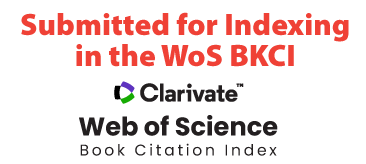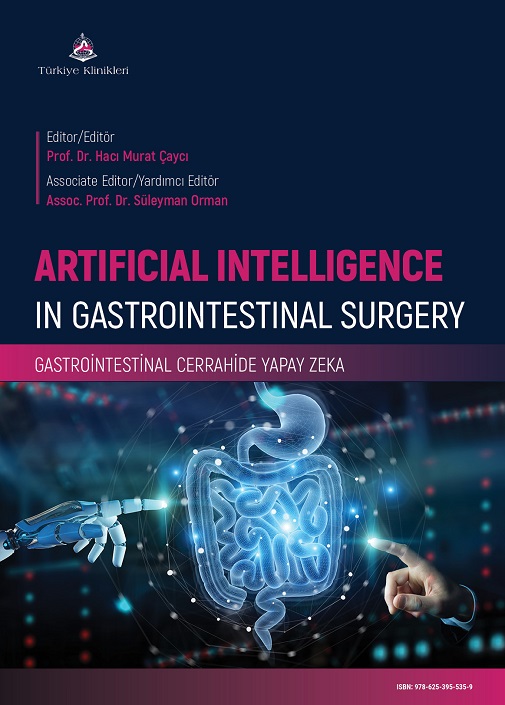| Editör/Editörler | Prof. Dr. Hacı Murat Çaycı |
|---|---|
| Editör Yardımcısı/Yardımcıları | Assoc. Prof. Dr. Süleyman Orman |
| ISBN Numarası | 978-625-395-535-9 |
| BISAC Codes | COM004000, MED031000, MED085060, MED085090 |
| Kitap Dili | İngilizce |
| Sayfa Sayısı | 193 |
| Basım Yılı | 2025 |

For more than 250 years, technological innovation has been the primary driver of scientific growth. The most important general-purpose technology of our age is artificial intelligence, the ability of machines to continue to improve their performance without having to explain exactly how to accomplish all the tasks assigned to them by humans. We can now create systems as sophisticated as machine learning (ML) that learn how to perform tasks independently. The healthcare system will also be significantly affected by this transformation in technology. Applications of advanced technologies such as AI and machine learning in the medical field can create revolutionary change, especially in the field of surgery. The aim of this book is to explore the contribution of artificial intelligence in gastrointestinal surgery, providing a comprehensive review of the latest developments and future potential.
Machine learning is not directly programmed for a specific outcome. In the second wave of the machine age, machines were built by humans to learn from examples. Successful ML systems often use a training dataset containing millions of examples. The algorithm that drives much of its success is based on an approach called deep learning, which uses neural networks. The role of deep learning in making surgical practices faster and more efficient is expected to increase day by day. This transformation can not only optimize surgeons’ decision-making processes but also significantly improve surgical outcomes.
This book provides in-depth analysis combined with chapters written by leading experts in the field. The first chapter discusses the role of AI in general medicine and surgery. It then examines in detail the unique approaches to the application of AI in each gastrointestinal disease group. It also delves into the impact of AI in hepatopancreatobiliary surgery, emergency and special applications, diagnostics and imaging. Finally, with assessments of medical education and future possibilities, the book presents the latest knowledge and experience in the field.
Understanding the place of artificial intelligence in surgical practices and using these developments in the most efficient way will be an indispensable skill for healthcare professionals. In this context, our book is not only an academic resource, but also provides an important guide for clinical practices. It should be known that artificial intelligence will not replace medical specialists, but doctors who use artificial intelligence will replace those who do not use it.
We hope that this book will be a valuable resource for all our colleagues who are interested in the new age teachings in this field.
Prof. Dr. Hacı Murat Çaycı
İstanbul Yeni Yüzyıl University, Faculty of Medicine,
Department of General Surgery,
İstanbul, Türkiye
Assoc. Prof. Dr. Süleyman Orman
Private Physician, Private Practice of Gastroenterology Surgery,
İstanbul, Türkiye
Bölümler
SECTION 1
INTRODUCTION TO ARTIFICAL INTELLIGENCE (AI) IN MEDICINE AND SURGERY
Section Editor/Kısım Editörü: Kamuran Cumhur Değer
01 | ARTIFICIAL INTELLIGENCE (AI) IN MEDICINE
Melih Can Gül
02 | ARTIFICIAL INTELLIGENCE (AI) IN SURGERY
Sadık Keşmer
03 | ETHICAL AND LEGAL CONSIDERATIONS IN ARTIFICIAL INTELLIGENCE (AI) FOR GASTROINTESTINAL SURGERY
Esin Şair
SECTION 2
ARTIFICIAL INTELLIGENCE (AI) IN GASTROINTESTINAL DISEASES
Section Editor/Kısım Editörü: Samet Yardımcı
04 | ARTIFICIAL INTELLIGENCE (AI) IN ESOPHAGUS DISEASES
Mehmet Reşit Sönmez
05 | ARTIFICIAL INTELLIGENCE (AI) IN STOMACH DISEASES
Özlem Zeliha Sert
06 | ARTIFICIAL INTELLIGENCE (AI) IN SMALL INTESTINE DISEASE
Necip Tolga Baran
07 | ARTIFICIAL INTELLIGENCE (AI) IN THE MANAGEMENT OF COLON DISEASES: NEW HORIZONS
Mehmet Torun
08 | ARTIFICIAL INTELLIGENCE (AI) IN ANORECTAL AND PELVIC DISEASES
Mehmet Ömer Özduman
09 | ARTIFICIAL INTELLIGENCE (AI) IN INFLAMMATORY BOWEL DISEASES
İsa Caner Aydın
SECTION 3
FROM HEPATOPANCREATOBILIARY SURGERY TO EDUCATION: FUTURE PERSPECTIVES OF ARTIFICIAL INTELLIGENCE (AI)
Section Editor/Kısım Editörü: Mehmet Akif Türkoğlu
10 | ARTIFICIAL INTELLIGENCE (AI) IN HEPATOBILIARY DISEASES
Şeref Oray
11 | ARTIFICIAL INTELLIGENCE (AI) IN THE MANAGEMENT OF PANCREATIC AND SPLENIC DISEASES
Mehmet Akif Türkoğlu
12 | ARTIFICIAL INTELLIGENCE (AI) IN MEDICAL AND SURGICAL EDUCATION
İlkay Halıcıoğlu
13 | FUTURE PERSPECTIVES AND CHALLENGES OF ARTIFICIAL INTELLIGENCE (AI) IN GASTROINTESTINAL SURGERY
Muhammet Kadri Çolakoğlu
SECTION 4
ARTIFICIAL INTELLIGENCE (AI) IN EMERGENCY AND SPECIALIZED APPLICATIONS
Section Editor/Kısım Editörü: Murat Ulaş
14 | ARTIFICIAL INTELLIGENCE (AI) IN EMERGENT GASTROINTESTINAL SURGERY
Habip Sarı
15 | ARTIFICIAL INTELLIGENCE (AI) IN PREDICTIVE ANALYTICS AND PERSONALIZED MEDICINE FOR GASTROINTESTINAL SURGERY
Cem Batuhan Ofluoğlu
16 | ARTIFICIAL INTELLIGENCE (AI) IN ROBOTIC-ASSISTED GASTROINTESTINAL SURGERY
Bülent Şen
SECTION 5
ARTIFICAL INTELLIGENCE (AI) IN DIAGNOSTICS AND IMAGING
Section Editor/Kısım Editörü: Tahsin Dalgıç
17 | ARTIFICAL INTELLIGENCE (AI) IN UPPER GASTROINTESTINAL ENDOSCOPY
Üsküdar Berkay Çaralan
18 | ARTIFICIAL INTELLIGENCE (AI) IN LOWER GASTROINTESTINAL ENDOSCOPY
Rıdvan Yavuz
19 | ARTIFICIAL INTELLIGENCE (AI) IN GASTROINTESTINAL RADIOLOGY
Abdülkadir Deniz


